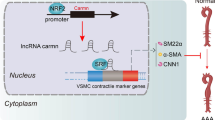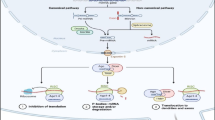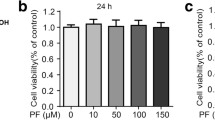Abstract
Background
LncRNA MALAT1 contributes to the inflammatory responses induced by lipopolysaccharides (LPS), which shares similar pathogenesis with ulcerative colitis (UC), indicating the potential involvement of MALAT1 in UC.
Methods
Expression of MALAT1 and lncRNA ANRIL in both UC patients and healthy controls was analyzed by RT-qPCR. ROC curve analysis was used to evaluate the diagnostic value of MALAT1 for UC. Cell transfections were performed to analyze the interactions between MALAT1 and ANRIL. Cell apoptosis was analyzed by cell apoptosis assay.
Results
In the present study, we found that MALAT1 was upregulated in colonic mucosa tissues of UC patients in comparison with healthy controls. Plasma levels of MALAT1 were also higher in UC patients than in healthy controls, and upregulation of plasma MALAT1 distinguished UC patients from healthy controls. ANRIL was also upregulated in colonic mucosa tissues of UC patients than in that of healthy controls. ANRIL and MALAT1 were significantly and positively correlated in UC patients but not in healthy controls. Normal colonic epithelial cells with ANRIL overexpression showed no significantly changed MALAT1 overexpression, while MALAT1 overexpression led to promoted ANRIL expression. MALAT1 and ANRIL overexpression led to promoted apoptosis of FHCs.
Conclusion
MALAT1 promotes ulcerative colitis by upregulating ANRIL.




Similar content being viewed by others
References
Molodecky NA, Soon IS, Rabi DM, et al. Increasing incidence and prevalence of the inflammatory bowel diseases with time, based on systematic review. Gastroenterology. 2012;142:46–54.
Eckburg PB, Relman DA. The role of microbes in Crohn’s disease. Clin Infect Dis. 2007;44:256–262.
Weinstock JV. Helminths and mucosal immune modulation. Ann NY Acad Sci. 2006;1072:356–364.
Hou JK, El-Serag H, Thirumurthi S. Distribution and manifestations of inflammatory bowel disease in Asians, Hispanics, and African Americans: a systematic review. Am J Gastroenterol. 2009;104:2100–2109.
Cho JH, Brant SR. Recent insights into the genetics of inflammatory bowel disease. Gastroenterology. 2011;140:1704–1712.
Ventham NT, Kennedy NA, Nimmo ER, et al. Beyond gene discovery in inflammatory bowel disease: the emerging role of epigenetics. Gastroenterology. 2013;145:293–308.
Chapman CG, Pekow J. The emerging role of miRNAs in inflammatory bowel disease: a review. Ther Adv Gastroenterol. 2015;8:4–22.
Engreitz JM, Haines JE, Perez EM, et al. Local regulation of gene expression by lncRNA promoters, transcription and splicing. Nature. 2016;539:452–455.
Luo S, Lu JY, Liu L, et al. Divergent lncRNAs regulate gene expression and lineage differentiation in pluripotent cells. Cell Stem Cell. 2016;18:637–652.
Zheng HT, Shi DB, Wang YW, et al. High expression of lncRNA MALAT1 suggests a biomarker of poor prognosis in colorectal cancer. Int J Clin Exp Pathol. 2014;7:3174–3181.
Liu JY, Yao J, Li XM, et al. Pathogenic role of lncRNA-MALAT1 in endothelial cell dysfunction in diabetes mellitus. Cell Death Dis. 2014;5:e1506.
Dai L, Zhang G, Cheng Z, et al. Knockdown of LncRNA MALAT1 contributes to the suppression of inflammatory responses by up-regulating miR-146a in LPS-induced acute lung injury. Connect Tissue Res. 2018;59:581–592.
Lange S, Delbro DS, Jennische E, et al. The role of the Lps gene in experimental ulcerative colitis in mice. Apmis. 1996;104:823–833.
Qiao C, Yang L, Wan J, et al. Long noncoding RNA ANRIL contributes to the development of ulcerative colitis by miR-323b-5p/TLR4/MyD88/NF-κB pathway. Biochem Biophys Res Commun. 2019;508:217–224.
Padua DM, Mahurkar-Joshi S, Law IKM, et al. A long noncoding RNA signature for ulcerative colitis identifies IFNG-AS1 as an enhancer of inflammation. Am J Physiol Gastrointest Liver Physiol. 2016;311:G446–G457.
Wu F, Huang Y, Dong F, et al. Ulcerative colitis-associated long noncoding RNA, BC012900, regulates intestinal epithelial cell apoptosis. Inflamm Bowel Dis. 2016;22:782–795.
Funding
Not applicable.
Author information
Authors and Affiliations
Corresponding author
Ethics declarations
Conflict of interest
The authors declare that they have no competing interests.
Additional information
Publisher's Note
Springer Nature remains neutral with regard to jurisdictional claims in published maps and institutional affiliations.
Rights and permissions
About this article
Cite this article
Zhu, M., Xie, J. LncRNA MALAT1 Promotes Ulcerative Colitis by Upregulating lncRNA ANRIL. Dig Dis Sci 65, 3191–3196 (2020). https://doi.org/10.1007/s10620-020-06093-w
Received:
Accepted:
Published:
Issue Date:
DOI: https://doi.org/10.1007/s10620-020-06093-w




